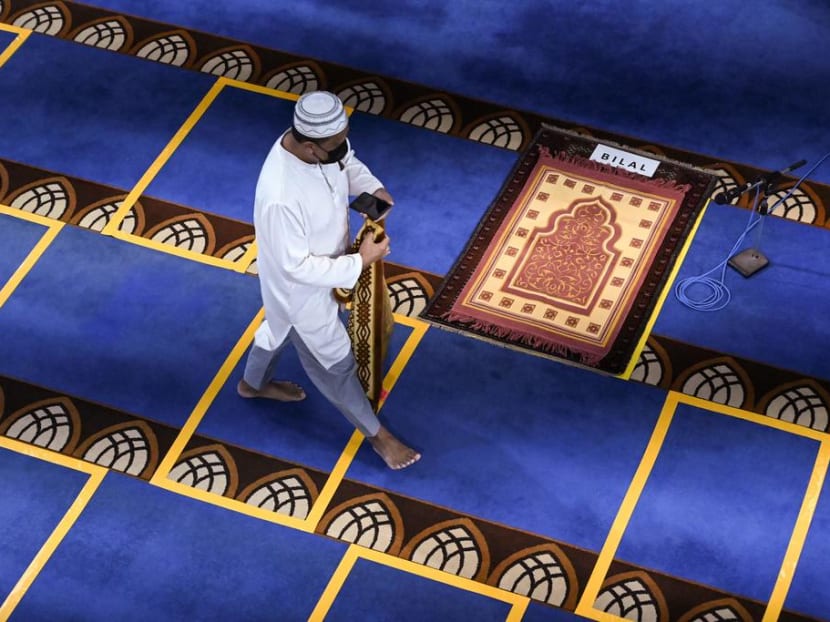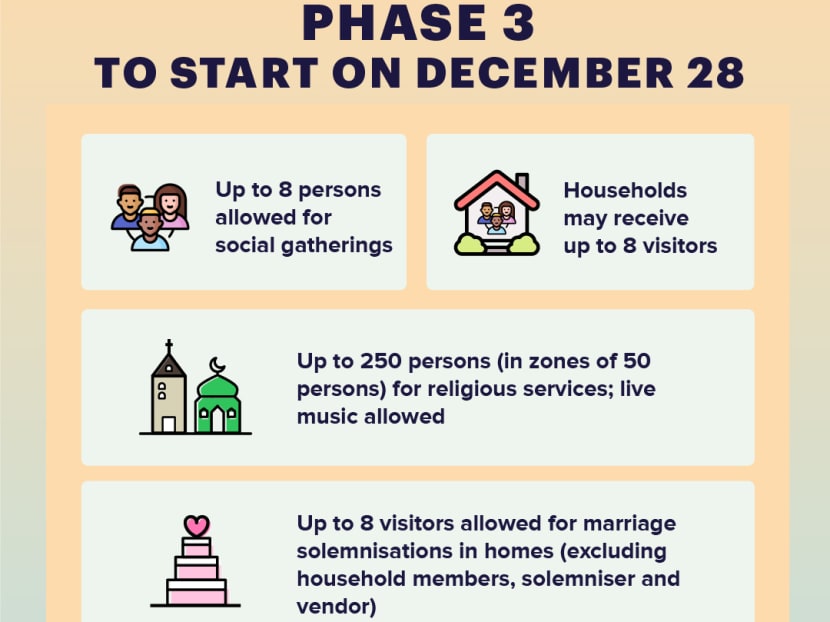More people allowed at religious services and live events, increased capacity at malls in Phase 3
SINGAPORE — With Singapore moving to the final phase of its exit from the circuit breaker, the authorities will allow more people to take part in social activities, such as attending religious services, marriage solemnisations, and live arts and cultural events.

Religious organisations will be able to increase their capacity for worship services to up to 250 people, separated in zones of up to 50 people.
- The Government will allow more people at worship services, marriage solemnisations and live performances in Phase Three
- It will also give malls and large stores the nod to let in more shoppers
- Government leaders are still asking Singaporeans to stay vigilant because Covid-19 is not eradicated
SINGAPORE — With Singapore moving to the final phase of reopening the economy after halting activities earlier in the year, the authorities will allow more people to take part in social activities such as attending religious services, marriage solemnisations, and live arts and cultural events.
Apart from allowing people to gather in groups of up to eight, the relaxed rules will permit:
-
Religious organisations to increase their capacity for worship services to up to 250 people, in five zones of up to 50 people each. This has been tested at some places of worship since October. Worship services as well as religious rites and prayers at places of worship may also involve live performance elements — such as with a limited number of singers, wind and other instruments — with precautions
-
Malls and large standalone stores to increase their capacity limits from 10 sqm per person to 8 sqm per person. Attractions may also start applying to the authorities to raise their operating capacity from 50 per cent to up to 65 per cent
-
Households hosting marriage solemnisations to invite up to eight visitors who are not from their households, and who are not the solemniser or vendors, into their homes. Right now, such hosting households can allow up to 10 people, including members of the household but excluding the solemniser and vendors
-
Marriage solemnisations at indoor venues, funerals and funerary-related activities to have live instrumental music, with precautions in place
-
Indoor live arts and cultural performances to hold up to 250 people, in zones of 50 each, after a pilot scheme started in November
-
Outdoor live performances to hold up to 250 people, in zones of up to 50 each, as part of pilots. This is an increase from the present 100-person cap
The Ministry of Health (MOH) said in a statement on Monday (Dec 14) that it would continue carrying out pilots for some high-risk activities and settings, such as busking, karaoke and nightlife activities, and assess how they may take place and be scaled up safely.
“If the local Covid situation remains stable and we are able to deploy more of our enablers to allow more activities to resume safely, the multi-ministry task force will consider allowing further resumption of activities, over the course of Phase Three,” MOH said.
Speaking on Monday at a press conference held by the multi-ministry task force handling the Covid-19 pandemic, Education Minister Lawrence Wong said that the authorities are building up capabilities to allow for greater resumption of activities, including having more antigen rapid testing for large-scale events.
In a live address to the nation just before that, Prime Minister Lee Hsien Loong announced that Singapore would enter the third and final phase of reopening its economy on Dec 28.
MOH said that check-ins and check-outs at public and private venues using the digital SafeEntry system that is done exclusively through the TraceTogether contact-tracing mobile application and physical tokens will be rolled out early next year — after everyone who wants the token has collected one from a community club or centre.
Until then, residents may still check in and out of venues via the TraceTogether app, the SingPass app that is the passcode system to access e-government services, QR (quick response) code reader apps or their identity cards.
Mr Wong added that one of the reasons why Singapore is embarking on Phase Three later this month is because it believes that 70 per cent of the resident population will be able to take up the TraceTogether apps and tokens by the end of the year.
However, the authorities would not stop once that target has been hit and will look to achieve a higher participation rate.
'HARD-WON GAINS'
Mr Wong, who has been co-chairing the task force since earlier this year, said that Singapore is now at a “significant milestone” and a new phase in fighting the Covid-19 pandemic.
“But all our hard-won gains will evaporate if we start to relax now. So it is critical for us to keep our guard up particularly in this final stretch,” he said.
He added that there have been “close misses” in recent weeks where people unaware that they are infected with Covid-19 gathered in large numbers, which could have the potential to trigger large clusters.
Given the festive period typical at the end of the calendar year, Mr Wong cautioned that there is still a need to remain vigilant and not let complacency set in, though he acknowledged that there will be some who will let their guard down.
He said that enforcement officers will still be on the ground doing their inspections at restaurants and that they will not hesitate to take enforcement actions if they see any individual or business violating the rules.
“In Phase Three, we are taking more risks, but it is a calculated risk. It is carefully calibrated to allow us to begin to resume more activities.
“I think we should consider this a privilege, not abuse it and continue our mindset of vigilance, of discipline and focus, as long as possible until we complete this fight against Covid-19,” Mr Wong added.
Health Minister Gan Kim Yong said that enforcement and discipline has to be strengthened in Phase Three as the risks of transmission goes up with more social and economic activities resuming.
“So that we can continue to contain the risk and keep the number of cases as low as possible and so that we can have a smooth and safe journey through Phase Three,” he said.












